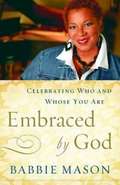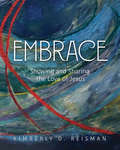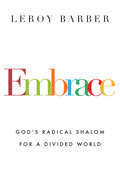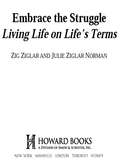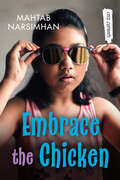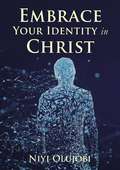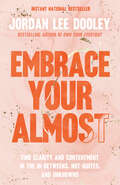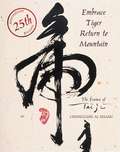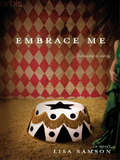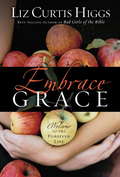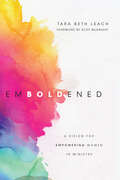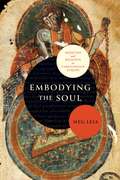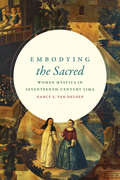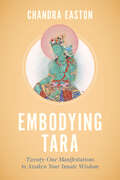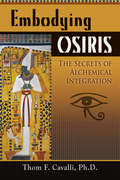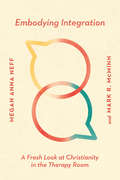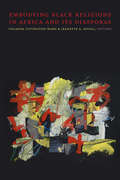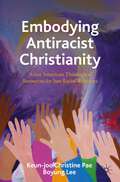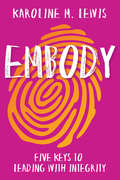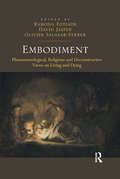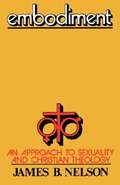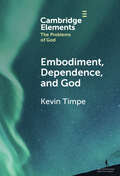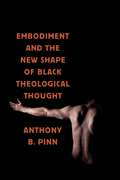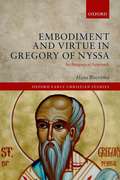- Table View
- List View
Embraced By God: Celebrating Who & Whose You Are (Embraced By God)
by Babbie MasonMany women not only struggle to understand who they are, they struggle to believe Whose they are. As daughters of the King we are not just precious but deeply loved. Babbie Mason shares her personal journey to understanding how very much God loved her, not as a singer or teacher but as His child. Here she equips readers to accept that love, and grow their confidence because of it. The book features three sections: * Understanding God's embrace * A Twenty-One Day Journey to Receive God's Embrace * Stepping Out in Faith Knowing You Are Embraced by God. Babbie's warm, creative and friendly approach will engage readers and encourage them on this blessed journey. Mason lives near Atlanta, Georgia. Her most recent releases include "Embrace."
Embrace: Showing and Sharing the Love of Jesus
by The Reverend ReismanEmbrace: Showing and Sharing the Love of Jesus is a faith-sharing resource to help you share your faith with boldness, confidence and grace. Embrace explores six values that comprise the essence of authentic faith sharing: · Humility · Clarity· Prayer · Integrity · Worship· UrgencyThis workbook is designed for use by individuals and small groups. Divided into six sessions – an introductory session followed by five sessions focusing on the essential values of faith sharing – it includes guidelines and activities for each weekly personal reading as well as for weekly gatherings with others.
Embrace: God's Radical Shalom for a Divided World
by Leroy BarberThe walls between us seem impenetrable. We live in an age of strife and division. Factors such as race, class, values and lifestyles keep us from connecting with others in meaningful ways. It's easy to avoid or ignore those who make us uncomfortable and those we simply do not like, but God's call to the church is to do just the opposite. Leroy Barber has spent decades pursuing reconciliation and justice amongst groups of vastly diverse people. He knows the challenge of embracing those who are difficult to embrace, yet he advocates that the way to radical shalom on earth is through pursuing these relationships. We have the opportunity as the people of God to bring true peace and unity to a world that desperately needs it. Embrace the challenge to show a divided world the bridge-building power of God's love.
Embrace the Struggle: Living Life on Life's Terms
by Zig Ziglar Julie Ziglar NormanOne of the leading stars in the "positive thinking" movement, Zig Ziglar has made a career out of telling people how to have a positive attitude, no matter what their circumstances are. But when a fall down a stairway onto a marble floor leaves him with a head injury, he is challenged with how to put the principles he'd been speaking about into practice. Ziglar's willingness to be transparent has him back writing and speaking with renewed energy before audiences in the tens of thousands to show that life on life's terms is still well worth living. Embrace the Struggle affirms the validity of the principles Ziglar has held true his entire life and includes not only his account of living positively through difficult circumstances; it also includes heartwarming stories of real people who encouraged him with how they put into practice these vital principles.
Embrace the Chicken (Orca Currents)
by Mahtab NarsimhanShivani only left Mumbai a few months ago. But she isn't feeling like such an outsider anymore. She likes her new school and she finally has a best friend. But when her mother volunteers for the school's annual fundraiser, Shivani is sure she will completely embarrass her. Especially if she cooks one of the "stinky" dishes that Shivani loves but is too ashamed to eat in front of her friends. On the day of the fair, the moment Shivani walks into the gym, she knows her worst fears have come true: the unmistakable scent of Indian spices is in the air. But then she sees that dozens of people are lined up at her mom's stall. It's the most popular one! This short novel is a high-interest, low-reading level book for middle-grade readers who are building reading skills, want a quick read or say they don’t like to read! The epub edition of this title is fully accessible.
Embrace Your Identity in Christ
by Niyi OlujobiThis book brings to light how the Father sees us with scriptural references and how we are to respond to the Father&’s heart for us. This book takes us from just embracing who we are in Him to assuming the responsibility of a son based on love and not necessarily duty.The revelation of our identity in Christ should be the foundation of all discipleship program for new believers in Christ and one of the key steps in ministering to those who are students of inner healing and the basis of follow-up after freedom sessions with people. The concept and revelation of our identity in Christ is crucial in developing a proper relationship with God our Father.Jesus came to model sonship. The first Adam (also known as a son of God), we never knew him when he was without sin and hence, cannot model on him however the last Adam came (known as the Son of God), we knew Him without sin and He modelled sonship in all forms that He might become our perfect example of what a son should look like.Based on our identity in Christ and our maturity in the same, we can now assume the responsibility of sonship. In the natural, the level of maturity of a son will determine the level of responsibility given to that son. The same is applicable in the kingdom of God. Your level of maturity in your sonship will determine the level of responsibility the Father can commit to you. This book is not just about affirming our identity in Christ but also challenges us on the responsibility of sonship.This book empowers you to overcome the works of darkness. 1 John 3:8 talks of the Son of God was manifested to destroy the works of the devil and as you assume and embrace your sonship, you will equally do the same, that is, destroy the works of the devil in your daily life.The world is waiting for the manifestation of the sons of God. It is time to arise into what God has made you to be. I celebrate the you that emerges after absorbing the truth of God that comes from the words in this book.May this book enable you live the victorious life you have been designed to live; may it enable you rise up to purpose and destiny in the kingdom of God and may it create a ripple effect on all those in whom you come in contact with.
Embrace Your Almost: Find Clarity and Contentment in the In-Betweens, Not-Quites, and Unknowns
by Jordan Lee DooleyA no-nonsense guide to the life you long for, even when it doesn&’t go according to plan, from the bestselling author of Own Your Everyday.&“If you are like me and need practical steps, hard-won wisdom, and a friend to help lead the way into a new season of promise, this redirection resource is what you need.&”—Lysa TerKeurst, #1 New York Times bestselling author and president of Proverbs 31 Ministries Jordan Lee Dooley knows firsthand how devastating it can be when you almost achieve a goal, almost reach a dream, or almost get to where you want to be, only to land just short of the finish line or watch it all fall apart at the last minute. Disrupted, delayed, or even seemingly destroyed dreams have a way of making us rethink everything. But perhaps rethinking dreams is not always the worst thing. In those moments, you have a chance to pause and consider what matters most to you in a world that&’s constantly telling you what you should want or should do.Believe it or not, it is possible to cultivate a life you really like—and one where you can succeed—in the tension of the middle, between where you started and where you hoped to be. Discover:• practical steps to move forward when your plans don&’t go according to plan • how to clarify which goals are right for you to pursue• what to do when dreams seem to come true for everyone but you• the unexpected gains that can arise from unwanted pain• how to know when it&’s time to let go of a dream—and what to do with the space left behindAs hard as unexpected interruptions, uncertainty, and in-between seasons may be, they also offer a unique invitation to align your dreams and goals with what matters most. It&’s time for you to gain greater clarity about what you truly want, why you want it, and how to pursue it.
Embrace Tiger, Return to Mountain: The Essence of Tai Ji
by Chungliang Al HuangIn the years since this timeless book was first published, many other books have come along offering the "essentials" of Tai Ji. But none have equaled Huang's unique understanding of Eastern tradition, which has made him one of the foremost interpreters of Tai Ji and its philosophies. (Spelled Tai Chi in the West)
Embrace Me
by Lisa SamsonBiting and gentle, hard-edged and hopeful . . . a beautiful fable of love and power, hiding and seeking, woundedness and redemption.When a "lizard woman," a self-mutilating preacher, a tattoed monk, and a sleazy lobbyist find themselves in the same North Carolina town one winter, their lives are edging precariously close to disaster . . . and improbably close to grace.
Embrace Grace: Welcome to the Forgiven Life
by Liz Curtis HiggsThe forgiven life. The grace-filled life. It begins with an embrace. Wherever you are spiritually, whatever you have been through emotionally, you are already enfolded in the arms of One who believes in you, supports you, treasures you. He is waiting for you to embrace him in return. To accept the gift he's offering you. To listen for the whispered words you've longed a lifetime to hear: You are loved. All is forgiven.
Emboldened: A Vision for Empowering Women in Ministry
by Tara Beth LeachThroughout Scripture and church history, women have been central to the mission of God. But all too often women have lacked opportunities to minister fully. Many churches lack visible examples of women in ministry and leadership. Pastor Tara Beth Leach issues a stirring call for a new generation of women in ministry: to teach, to preach, to shepherd, and to lead. God not only permits women to minister—he emboldens, empowers, and unleashes women to lead out of the fullness of who they are. The church cannot reach its full potential without women using their God-given gifts. Leach provides practical expertise for how women can find their place at the table, escape impostor syndrome, face opposition, mentor others, and much more. When women teach, preach, lead, evangelize, pastor, and disciple, and when men partner to embolden the women in their lives, the church's imagination expands to better reflect God's story and hope for the world.
Embodying the Soul: Medicine and Religion in Carolingian Europe (The Middle Ages Series)
by Meg LejaEmbodying the Soul explores the possibilities and limitations of human intervention in the body's health across the ninth-century Carolingian Empire. Early medieval medicine has long been cast as a superstitious, degraded remnant of a vigorous, rational Greco-Roman tradition. Against such assumptions, Meg Leja argues that Carolingian scholars engaged in an active debate regarding the value of Hippocratic knowledge, a debate framed by the efforts to define Christian orthodoxy that were central to the reforms of Charlemagne and his successors.From a subject with pagan origins that had suspicious links with magic, medical knowledge gradually came to be classified as a sacred art. This development coincided with an intensifying belief that body and soul, the two components of individual identity, cultivated virtue not by waging combat against one another but by working together harmoniously. The book demonstrates that new discussions regarding the legitimacy of medical learning and the merits of good health encouraged a style of self-governance that left an enduring mark on medieval conceptions of individual responsibility. The chapters tackle questions about the soul's material occupation of the body, the spiritual meaning of illness, and the difficulty of diagnosing the ills of the internal bodily cavity.Combating the silence on "dark-age" medicine, Embodying the Soul uncovers new understandings of the physician, the popularity of preventative regimens, and the theological importance attached to dietary regulation and bloodletting. In presenting a cultural history of the body, the book considers a broad range of evidence: theological and pastoral treatises, monastic rules, court poetry, capitularies, hagiographies, biographies, and biblical exegesis. Most important, it offers a dynamic reinterpretation of the large numbers of medical manuscripts that survive from the ninth century but have rarely been the focus of historical study.
Embodying the Sacred: Women Mystics in Seventeenth-Century Lima
by Nancy E. van DeusenIn seventeenth-century Lima, pious Catholic women gained profound theological understanding and enacted expressions of spiritual devotion by engaging with a wide range of sacred texts and objects, as well as with one another, their families, and ecclesiastical authorities. In Embodying the Sacred, Nancy E. van Deusen considers how women created and navigated a spiritual existence within the colonial city's complex social milieu. Through close readings of diverse primary sources, van Deusen shows that these women recognized the divine—or were objectified as conduits of holiness—in innovative and powerful ways: dressing a religious statue, performing charitable acts, sharing interiorized spiritual visions, constructing autobiographical texts, or offering their hair or fingernails to disciples as living relics. In these manifestations of piety, each of these women transcended the limited outlets available to them for expressing and enacting their faith in colonial Lima, and each transformed early modern Catholicism in meaningful ways.
Embodying Tara: Twenty-One Manifestations to Awaken Your Innate Wisdom
by Chandra EastonRealize the power of Tara, the Buddhist goddess of compassion, within yourself in this modern guide to her 21 forms.Explore down-to-earth meditations and stories of real women who embody Tara's qualities.Tara, the Buddhist goddess of compassion, can manifest within all of us. In this illustrated introduction to Tara's twenty-one forms, respected female Buddhist teacher and practitioner Dorje Lopön Chandra Easton shows you how to invite Tara&’s awakened energy to come alive in yourself through: insight into core Buddhist concepts and teachings;meditations;mantra recitations; andjournal exercises.The relatable stories from Buddhist history and the author&’s personal reflections will give you the tools to live a more compassionate life, befriend your fears, and overcome everyday challenges. Find out how important women and movements in modern history have achieved this through their own embodiment of Tara's enlightened activities. The stories of Jane Goodall, Nawal El Saadawi, Oprah Winfrey, Vandana Shiva, Black Lives Matter, Me Too, and others will inspire you to bring these aspects of Tara into the world in creative and socially conscious ways for the benefit of all.
Embodying Osiris
by Thom F CavalliThe modern Western movement to embrace Eastern spiritual traditions usually stops with India and the Orient. Westerners have yet to discover the wisdom that dates back even further to ancient Egypt. With a Jungian perspective, clinical psychologist Dr. Thom F. Cavalli plumbs that wisdom through the myth of Osiris, the green-skinned Egyptian god of vegetation and the Underworld. As no one else has done, Cavalli draws on Osiris's death and resurrection as a guide to spiritual transformation. The myth represents the joining of the conscious and the unconscious, the light and the dark, life and death, and shows how to live our temporal existence in service to and anticipation of eternal life. Cavalli sees the ancient art of alchemy -- which attempted to turn lead into gold -- as the key. The alchemical recipe "solve et coagula" (solution and coagulation) encoded in the myth describes the integration of all parts of a person and the method for achieving an experience of immortality in life and eternal life after death. The Osiris myth thus provides a model for the contemporary quest for individuation, the Jungian term for integrating ego and self, body and soul, in the process of becoming whole.
Embodying Osiris
by Thom F. CavalliThe modern Western movement to embrace Eastern spiritual traditions usually stops with India and the Orient. Westerners have yet to discover the wisdom that dates back even further to ancient Egypt. With a Jungian perspective, clinical psychologist Dr. Thom F. Cavalli plumbs that wisdom through the myth of Osiris, the green-skinned Egyptian god of vegetation and the Underworld. As no one else has done, Cavalli draws on Osiris's death and resurrection as a guide to spiritual transformation. The myth represents the joining of the conscious and the unconscious, the light and the dark, life and death, and shows how to live our temporal existence in service to and anticipation of eternal life. Cavalli sees the ancient art of alchemy - which attempted to turn lead into gold - as the key. The alchemical recipe "solve et coagula" (solution and coagulation) encoded in the myth describes the integration of all parts of a person and the method for achieving an experience of immortality in life and eternal life after death. The Osiris myth thus provides a model for the contemporary quest for individuation, the Jungian term for integrating ego and self, body and soul, in the process of becoming whole.
Embodying Integration: A Fresh Look at Christianity in the Therapy Room (Christian Association for Psychological Studies Books)
by Megan Anna Neff Mark R. McMinnDiscussing spirituality and religion in the therapy room is increasingly accepted, some even forgetting that integration of psychology and Christianity was once a rare thing.Embodying Integration
Embodying Black Religions in Africa and Its Diasporas (Religious Cultures of African and African Diaspora People)
by Yolanda Covington-Ward and Jeanette S. JouiliThe contributors to Embodying Black Religions in Africa and Its Diasporas investigate the complex intersections between the body, religious expression, and the construction and transformation of social relationships and political and economic power. Among other topics, the essays examine the dynamics of religious and racial identity among Brazilian Neo-Pentecostals; the significance of cloth coverings in Islamic practice in northern Nigeria; the ethics of socially engaged hip hop lyrics by Black Muslim artists in Britain; ritual dance performances among Mama Tchamba devotees in Togo; and how Ifá practitioners from Mexico, Colombia, Venezuela, Trinidad, and the United States join together in a shared spiritual ethnicity. From possession and spirit-induced trembling to dance, the contributors outline how embodied religious practices are central to expressing and shaping interiority and spiritual lives, national and ethnic belonging, ways of knowing and techniques of healing, and sexual and gender politics. In this way, the body is a crucial site of religiously motivated social action for people of African descent.Contributors. Rachel Cantave, Youssef Carter, N. Fadeke Castor, Yolanda Covington-Ward, Casey Golomski, Elyan Jeanine Hill, Nathanael J. Homewood, Jeanette S. Jouili, Bertin M. Louis Jr., Camee Maddox-Wingfield, Aaron Montoya, Jacob K. Olupona, Elisha P. Renne
Embodying Antiracist Christianity: Asian American Theological Resources for Just Racial Relations
by Boyung Lee Keun-joo Christine PaeAt a moment of notably rising levels of anti-Asian hate, this book offers antiracist resources informed by Asian/North American feminist theology and biblical scholarship. Although there exist scholarly books and articles on Asian American theology (broadly defined) have proliferated in response to the current ethical, political, and cultural environment have been prolific, there have been few concerted efforts to interrogate or dismantle anti-Asian racism inseparable from anti-black racism, and white settler colonialism that have often undermined the communal spirit and livelihood of Christian churches in the current political climate. In the current political climate, COVID-related anti-Asian hate and racial conflict, which all intersect with gender and sexuality-based violence, require theological, moral, and political inquiries. Hence, this book notes the current paucity of work with critical discussions on the multiple facets of racism from Asian American feminist theological perspectives. Contributors deepen the inter/transdisciplinary approaches concerning how to dismantle racist theological teachings, biblical interpretations, liturgical presentations, and the Christian church’s leadership structure.
Embody: Five Keys to Leading with Integrity
by Karoline M. LewisPastors and other leaders feel trapped in systems and institutions where actions and decisions often seem to have little to do with the scripture they read or the theology they profess. They are swept into leadership norms that resemble business models more than mission. They see in others and (sometimes) recognize in themselves the disconnect between their own theology and their leadership. They feel unable to fully integrate their beliefs with their behavior.Many leaders—younger ones, especially—are frustrated and disillusioned by this disconnect. They see hypocrisy all around them, and in themselves. They see that our culture is at a critical juncture, which gives ministry a greater sense of urgency. But they want to do things differently, to be what they believe. They want to embody their Christian beliefs in every decision, every act of ministry leadership.The functional authority of scripture must be evident in the way church leaders lead, both within the congregation and in the public square. lead our churches. The way we church leaders lead proves the bible does—or does not—matter. In Embody, Karoline Lewis shows how to frame leadership in the church and public square theologically, and from the perspective of incarnation. She shows how leadership can be a direct line between what you believe and what you do. She incorporates examples of Jesus' leadership and the Paraclete in the Gospel of John, showing how leadership was achieved by walking beside. Embody offers practical things for the reader to consider and do, instruction and guidance for how to make the ‘integration steps’ necessary in order to become an embodied leader, and exploration of core components of embodied leadership.
Embodiment: Phenomenological, Religious and Deconstructive Views on Living and Dying
by Ramona Fotiade David Jasper Olivier Salazar-FerrerThis book examines a number of landmark shifts in our account of the relationship between human and divine existence, as reflected through the perception of time and corporeal experience. Drawing together some of the best scholars in the field, this book provides a representative cross-section of influential trends in the philosophy of religion (e.g. phenomenology, existential thought, Biblical hermeneutics, deconstruction) that have shaped our understanding of the body in its profane and sacred dimensions as site of conflicting discourses on presence and absence, subjectivity and the death of the subject, mortality, resurrection and eternal life.
Embodiment: An Approach To Sexuality And Christian Theology
by James NelsonFew would doubt that this is a time of transition in our understanding of human sexuality. The confusion about sexual morals and mores is the more obvious evidence of this. But there is something else. For too long the bulk of Christian reflection about sexuality has asked an essentially one-directional question: what does Christian faith have to say about our lives as sexual beings?
Embodiment, Dependence, and God (Elements in the Problems of God)
by Kevin TimpeThe significance of our physical bodies is an important topic in contemporary philosophy and theology. Reflection on the body often assumes, even if only implicitly, idealizations that obscure important facts about what it means for humans to be 'enfleshed.' This Element explores a number of ways that reflection on bodies in their concrete particularities is important. It begins with a consideration of why certain forms of idealization are philosophically problematic. It then explores how a number of features of bodies can reveal important truths about human nature, embodiment, and dependence. Careful reflection on the body raises important questions related to community and interdependence. The Element concludes by exploring the ethical demands we face given human embodiment. Among other results, this Element exposes the reader to the wide diversity of human embodiment and the nature of human dependence, encouraging meaningful theological reflection on aspects of the human condition.
Embodiment and the New Shape of Black Theological Thought (Religion, Race, and Ethnicity)
by Anthony B. PinnBlack theology tends to be a theology about no-body. Though one might assume that black and womanist theology have already given significant attention to the nature and meaning of black bodies as a theological issue, this inquiry has primarily taken the form of a focus on issues relating to liberation, treating the body in abstract terms rather than focusing on the experiencing of a material, fleshy reality. By focusing on the body as a physical entity and not just a metaphorical one, Pinn offers a new approach to theological thinking about race, gender, and sexuality.According to Pinn, the body is of profound theological importance. In this first text on black theology to take embodiment as its starting point and its goal, Pinn interrogates the traditional source materials for black theology, such as spirituals and slave narratives, seeking to link them to materials such as photography that highlight the theological importance of the body. Employing a multidisciplinary approach spanning from the sociology of the body and philosophy to anthropology and art history, Embodiment and the New Shape of Black Theological Thought pushes black theology to the next level.
Embodiment And Virtue In Gregory Of Nyssa: An Anagogical Approach (Oxford Early Christian Studies)
by Hans Boersma<P>Embodiment in the theology of Gregory of Nyssa is a much-debated topic. Hans Boersma argues that this - worldly realities of time and space, which include embodiment, are not the focus of Gregory's theology. Instead, embodiment plays a distinctly subordinate role. The key to his theology, Boersma suggests, is anagogy, going upward in order to participate in the life of God. <P>This book looks at a variety of topics connected to embodiment in Gregory's thought: time and space; allegory; gender, sexuality, and virginity; death and mourning; slavery, homelessness, and poverty; and the church as the body of Christ. In each instance, Boersma maintains, Gregory values embodiment only inasmuch as it enables us to go upward in the intellectual realm of the heavenly future. <P>Boersma suggests that for Gregory embodiment and virtue serve the anagogical pursuit of otherworldly realities. Countering recent trends in scholarship that highlight Gregory's appreciation of the goodness of creation, this book argues that Gregory looks at embodiment as a means for human beings to grow in virtue and so to participate in the divine life. <P>It is true that, as a Christian thinker, Gregory regards the creator-creature distinction as basic. But he also works with the distinction between spirit and matter. And Nyssen is convinced that in the hereafter the categories of time and space will disappear - while the human body will undergo an inconceivable transformation. This book, then, serves as a reminder of the profoundly otherworldly cast of Gregory's theology.
